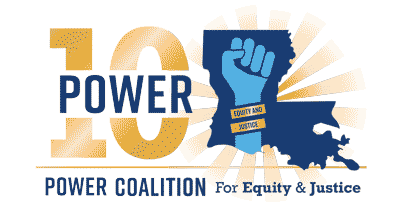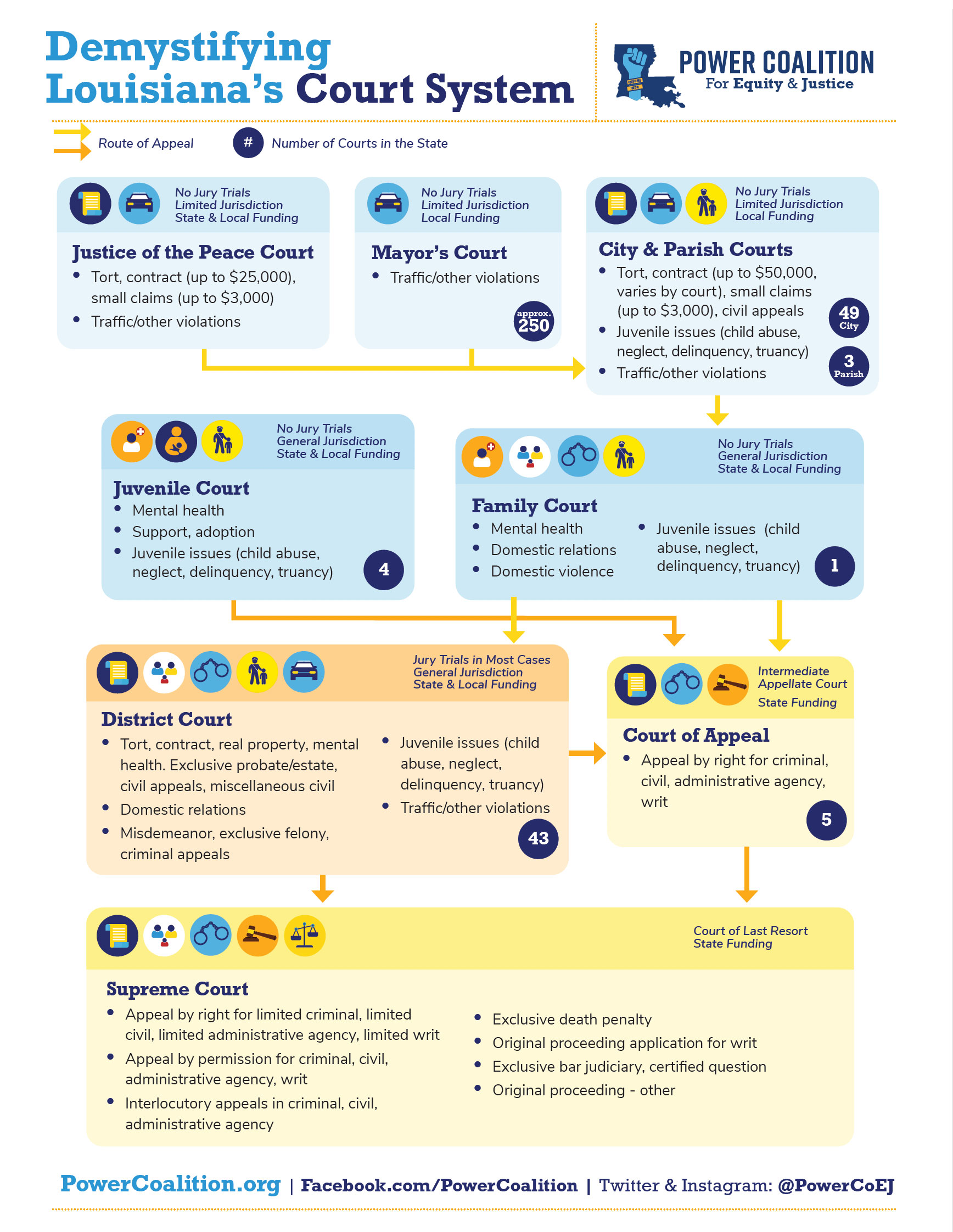
What Do Your Elected Officials Do?
Fall election ballots will give you the opportunity to vote on local, judicial, state, and federal offices. Not all of these races will be on every ballot, but you will get the chance to vote on many of them. The Power Coalition has put together this primer to help you prepare to geaux vote this election season. Make your voice heard and your power felt at the polls.
Federal Government
Part of the legislative branch of the U.S. Government that makes laws, also referred to as a congressman or congresswoman, each U.S. representative is elected to a two-year term serving the people of a specific congressional district. They must be 25 years of age, a U.S. citizen for at least seven years, and a resident of the state they represent.
Representatives introduce bills and resolutions, offer amendments and serve on committees. The House has several powers assigned exclusively to it, including the power to initiate revenue bills, impeach federal officials, and elect the President in the case of an electoral college tie. The House of Representatives is made up of 435 elected members, divided among the 50 states in proportion to their total population. In addition, there are 6 non-voting members, representing the District of Columbia, the Commonwealth of Puerto Rico, and four other territories of the United States. The presiding officer of the chamber is the Speaker of the House, elected by the Representatives. This person is third in the line of succession to the Presidency.
Another part of the legislative branch of the U.S. Government that makes laws. The Senate has 100 members, 2 from each state, who are elected to serve for a term of 6 years. Senators must be 30 years of age, U.S. citizens for at least nine years, and residents of the state they represent. Similar to the House of Representatives the Senate votes on bills, resolutions, motions, amendments, nominations, and treaties in a variety of ways. The Vice President of the United States serves as President of the Senate and may cast the decisive vote in the event of a tie in the Senate. The Senate also tries impeachment cases for federal officials referred to it by the House.
Together the U.S. Representatives and the U.S. Senators make up congress.
State Government
Your State Senator is elected by voters in your senate district to represent that district in the state legislature. There are 39 senators in the Louisiana legislature, and each senate district contains an average of approximately 116,000 people. Elections to the Senate occur every four years, and senators are limited three four-year terms (12 years).
Responsibilities The primary duties of a state senator are creating, debating, and voting on legislation that either makes new laws or modifies existing ones. Legislation must be approved by the Senate, as well as the House of Representatives, before being signed into law by the Governor.
The laws either created or modified by the state legislature are an important addition to the laws that must be followed at the local level as well as at the federal level.
Your State Representative is elected by voters in your district to represent the district in the state legislature. There are 105 representatives in the Louisiana legislature, each of whom represents approximately 42,500 people. Members serve four-year terms with a term limit of three terms (total 12 years).
Responsibilities
Primary duties of a State Representative are creating, debating, and voting on legislation that either makes new laws or modifies existing ones. Legislation must be approved by the State House of Representatives, as well as the State Senate, before being signed into law by the Governor of the state.
The laws either created or modified by the state legislature are an important addition to the laws that must be followed at the local level as well as at the federal level.
The
Responsibilities
- Triggering emergency powers and related response actions during natural disasters, weather events, energy crises, public health emergencies, mass casualty events, and other situations requiring immediate attention
- Creating the state budget - the governor controls where the state's money will go. This is important because the governor can use this money to promote or fund what causes they think are important in the state. For example, if they believe education is important they will give a lot of funding toward education
- Clemency authority
- Appointing cabinet members - Superintendent, Louisiana State Police, Secretary, Louisiana Department of Transportation and Development, Commissioner of Conservation, Louisiana's National Guard's adjutant, secretary of Wildlife and Fisheries, Commissioner of the Office of Motor Vehicles
- Controlling what bills are passed or vetoed in the State. This is important because the governor passes the laws that they want to see implemented in the state or vetoes the ones they do not
The Attorney General serves a four-year term, is the chief legal officer of the state, and is the head of the Louisiana Department of Justice.
Responsibilities
The office of the Attorney General manages hundreds of lawyers within the state and provides legal representation to the state. It also enforces state law, ensures that the state itself is following state and federal laws, and is in compliance with federal law, and conducts public education programs.
Lieutenant Governor
The lieutenant governor serves as governor in the event of a vacancy in the office of governor or if the governor is unable to act as governor or is out of the state. The lieutenant governor is an ex officio member of any committee or board on which the governor serves. Otherwise, the lieutenant governor has the powers and duties delegated to him or her by the governor or as provided by law.
- appoints the board of commissioners of the State Library of Louisiana
- appoints 17 members to the Louisiana Tourism Development Commission
- appoints three members to the Louisiana State Arts Council
- designates one non-voting member of the Lake Fausse Point, Lake Dauterive, and Grand Avoille Cove Advisory Board
- Responsibilities are "open-ended" - this is important to note because oftentimes their jobs and responsibilities are not given as much attention as the governor.
- jointly develops the state’s plan to retain persons aged 50 or older
The State Treasurer serves as the chief custodian of the state’s Treasury and is the state’s head banker. The Treasurer serves a four-year term.
Responsibilities
The Treasurer receives and deposits state monies, manages investments, and keeps track of budget surpluses and deficits, and must ensure that the state has enough money to pay all of its bills on time.
The Treasurer is also the head of the Treasury Department, which serves as the “central bank” of Louisiana and is where public money for state government is deposited and withdrawn. Additional duties include leading the State Bond Commission and overseeing the Unclaimed Property Division of the Treasury, which is responsible for returning lost money to its rightful owner.
Secretary of State
The Secretary of State heads the Department of State and is the state’s chief election officer.
- prepares and certifies the ballots for all elections
- promulgates all election returns
- administers the election laws - except those relating to voter registration and custody of voting machines
(Although this is unlawful, the Secretary of State can use their position to suppress the vote which was seen with Georgia's former Secretary of State Brian Kemp.
This position is the ultimate judge of registered voters and a very powerful position) - administer the state corporation and trademark laws;
- serve as keeper of the Great Seal of the State of Louisiana and attest therewith all official laws, documents,
proclamations, and commissions - administer and preserve the official archives of the state
- promulgate and publish all laws enacted by the legislature and retain the originals thereof
- countersign and keep an official registry of all commissions.
Commissioner of Insurance
The Commissioner of Insurance is the head of the Louisiana Department of Insurance (LDI), and is elected every four years. The LDI contains the Office of Consumer Advocacy and the Division of Diversity & Opportunity, and is made up of the following boards and commissions: Louisiana Health Care Commission, Louisiana Property & Casualty Commission, Louisiana Auto Theft & Insurance Fraud Prevention Authority.
Responsibilities
The LDI regulates the insurance industry according to state law, educates consumers, and advocates for consumer protections. It also reports to the state legislature, which can affect the insurance industry and, in turn, consumers. Another important role of this agency is running the Senior Health Insurance Information Program, which helps senior citizens better understand Medicare coverage options and benefits to make more informed decisions.
You can go to the LDI website to lodge consumer complaints, and they publish resources and updates for consumers.
The Commissioner of Agriculture and Forestry leads the Louisiana Department of Agriculture and Forestry. The Commissioner is elected every four years and is not subject to term limits.
Responsibilities
The Louisiana Department of Agriculture and Forestry is responsible for administering the programs and enforcing the regulations that impact every aspect of the state’s agriculture and forestry, including agricultural chemistry programs, horticulture programs, pesticide and environmental programs, conservation, seed programs, animal health, food safety, forestry, and medical marijuana.
These programs are intended to ensure food safety in Louisiana and that the environment remains suitable for continued growth of the state’s economy.
BESE is made up of 11 members, eight are elected from the BESE districts, and the other three are appointed by the Governor and confirmed by the State Senate. BESE members elect a president, vice president, and secretary-treasurer from its membership.
The members are also divided into four separate committees: Administration and Finance, Educator Effectiveness, Academic Goals and Instructional Improvement, School Innovation and Turnaround. Each committee considers issues within its specific subject area and then makes recommendations to the Board as a whole.
Responsibilities BESE has the responsibility for governing all Louisiana elementary and secondary schools; special schools for the deaf, blind, and physically handicapped; and educational units within the state’s correctional institutions and mental facilities. There are also Task Forces/Commissions and Advisory Councils within BESE.
BESE has the authority to create policies that govern the statewide operations of public and non-public schools, to administer the budget for educational programs and services at those schools, and to conduct administrative hearings to resolve any conflict concerning its policies and actions. Some of the many specifically defined duties assigned to this board by law include approval of certification requirements, policies for assessment and evaluation of teachers, administrators and students, approval of textbooks, and administering the state’s charter school program.
Regional & Local Government
The Louisiana Public Service Commission (LPSC) is an independent regulatory agency dedicated to serving the public interest by assuring safe, reliable, and reasonably priced service from public utilities and motor carriers. The LPSC consists of five elected Commissioners who serve overlapping terms of six years.
Responsibilities
The goals of the Commission are to ensure a regulatory balance that enables utilities to provide customers with safe, adequate and reliable service, at rates that are just and reasonable, equitable and economically efficient. The LPSC also takes an active and cautious role in the development of a competitive, market-based approach to utility regulation.
In Louisiana, most elected bodies that govern parishwide are called Police Juries, but their duties and responsibilities are essentially identical to a Parish Council. City Council and Parish Council/Police Jury members represent districts within their parishes or municipalities.
Responsibilities
Councils hold regular public meetings and have the opportunity to reshape how their parish or municipality addresses crucial issues, like public safety, equitable economic opportunity, and infrastructure. They vote on policy decisions governing their jurisdictions--which are often introduced based on citizen input--and approve budgets, and can appoint members of commissions, civil service boards, and other governing bodies within a parish or city.
An alderman is a member of a municipal assembly or council that represents a specific area of a municipality.
Responsibilities
The alderman board (by ordinance) sets the salaries of the mayor, aldermen, clerk, chief of police and all other municipal officers. The board approves or disapproves the annual operating and capital improvements budgets submitted by the mayor.
The Sheriff’s office in your parish provides law enforcement, detention, court security, and homeland security services within that parish. It also enforces state law within the parish and maintains the parish prison.
The Sheriff has an influential role in providing a fair and responsible police force that citizens can rely on to provide equitable justice regardless of our individual characteristics (such as race, religion, sexual orientation, and gender identity).
Assessor
The assessor is a local government official who determines the value of property for local real estate taxation purposes. The Assessor’s Office places a value on land, homes, commercial buildings and other taxable property in your parish.
Legal System
As the chief prosecutor for a judicial district (sometimes a single parish, sometimes covering multiple parishes), DAs largely shape how your parish’s criminal legal system is operated. Your vote for DA can reshape the criminal legal system in your parish and in Louisiana.
Responsibilities: DAs have the power to choose which charges are filed against an individual accused of a crime, divert the accused to a program, or dismiss the case altogether. The DA also has the power to identify and tackle racial disparities within the criminal legal system.
Courts
Supreme Court
The Supreme Court is Louisiana’s highest court and serves as the final stop for cases that are appealed in the state. Its decisions often serve as the final word on legal disputes in Louisiana. There are seven Supreme Court districts throughout Louisiana, with one justice elected from each of the districts. The justices of the Louisiana Supreme Court serve 10 year terms of office.
Responsibilities: The Louisiana Supreme Court hears all cases involving disciplinary actions against lawyers and judges, all cases in which a law or ordinance has been declared unconstitutional, and all capital cases where the death penalty has been imposed. The senior justice is the Chief Justice, who is the chief administrative officer of the judicial system.
There are five Circuit Courts of Appeal, each covering a different group of parishes. The Courts of Appeal have appellate jurisdiction over all civil matters, all matters appealed from family and juvenile courts, and most criminal cases that are triable by a jury.
District court judges make important decisions in civil and criminal cases (mainly felonies and property-related matters) that impact not only the parties who appear in court for specific cases, but also the community at large. They also handle appeals of criminal cases tried by city, municipal, and traffic courts (with a few exceptions).
Juvenile Court hears juvenile delinquency cases, and cases when children are ungovernable, truant or runaways. They also handle what are known as Child in Need of Care cases, which result when a child has been abused, neglected, or abandoned.
City and Parish Courts typically have civil jurisdiction over cases involving small claims, evictions, and traffic violations. Different parishes and cities may have individual rules about the maximum claims to be made in their courts.
Magistrate Judges are the first judges you see, and they determine how your case moves forward. They also often conduct mediations, resolve discovery disputes, and decide a variety of motions. They determine whether criminal defendants will be detained or released on a bond, and may appoint counsel for defendants.
Justices of the peace have no criminal jurisdiction, except as committing magistrates and for the issuance of peace bonds. They have original civil jurisdiction in cases up to $5,000, but are NOT allowed to decide lawsuits involving title to real estate, the right to public office, divorce proceedings, suits against public bodies, and executory proceedings.
The role of the constable is to preserve the public peace, execute the process in City Courts and Justice of Peace Courts, and discharge other functions assigned by law. They serve warrants and summonses, collect garnishments, and process evictions and other matters pertaining to the court.




